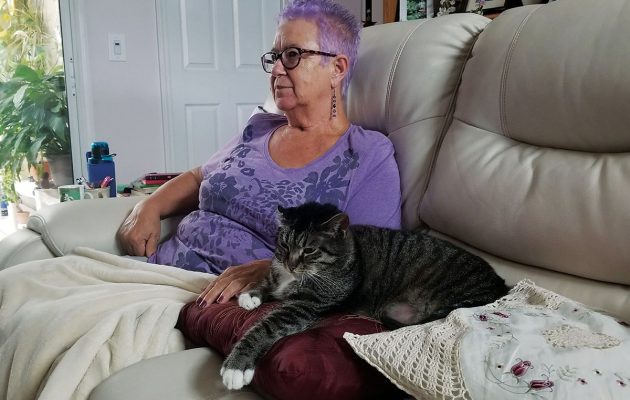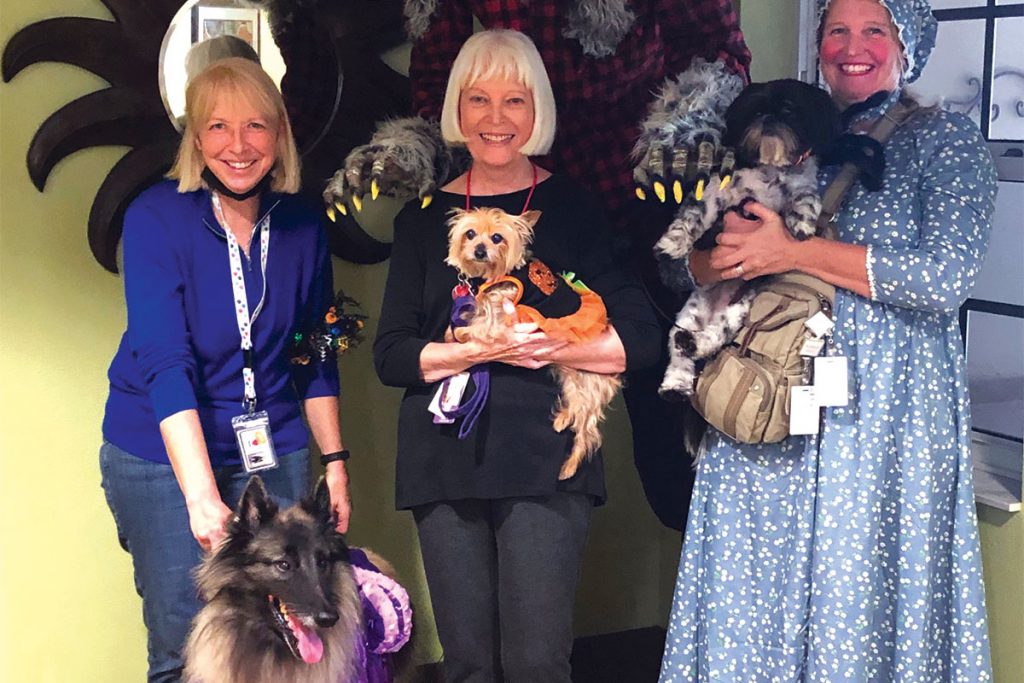Animal House: Pet Program Comforts Hospice Patients

The smile of joy on the face of a hospice patient who sees his or her beloved pet coming through the door for a visit, lifts the spirits of anyone privileged to witness the sight. Community Hospice & Palliative Care, Pet Peace of Mind Program volunteers make these visits possible for patients who can no longer care for, or live with their pet, according to Christine (Chris) Whitney, volunteer coordinator.
“For our patients who need to move into a facility or nursing home or who can no longer care for their pet, this is an upsetting and stressful situation. They may have no family or friends able or willing to care for or adopt their pet,” Chris Whitney said. “We had a nurse and a social worker extremely concerned and trying everything they could think of to encourage one patient to enter a nursing home. The patient was so ill she could no longer care for herself, but she refused to move, delaying desperately needed care because she was so worried about what would happen to the dog she loved so much,” Whitney said. “We arranged for volunteers to care for and walk her dog daily until a perfect foster was found. The foster brought the patient’s dog to visit her as often as possible until she passed. This story had a perfect ending, because that volunteer foster adopted the lady’s dog.”
Scientific research has documented the lifelong mental and physical benefits of pet ownership for all ages, but the love and companionship of a beloved pet at the end of life brings comfort unlike anything else. Pets can reduce stress, increase sensory stimulation, lessen pain, discomfort or anxiety, spark happy memories and re-establish connection with family or the outside world.
Community Hospice & Palliative Care partnered with the national Pet Peace of Mind Program in 2014 for those very reasons and because they recognized the need to care for patients’ pets, when there are no other options. The program exists for patients who have received a prognosis of 12 months or less of life (or six months for Medicare). It serves as a compassionate last option for patients with a cat or dog but no one to care for that pet.
The Pet Peace of Mind national and local programs focus on keeping pets with their owners who are seriously ill or in hospice care, to preserve their loving bond when they need each other the most. The national program teaches hospices how to provide pet care assistance for their patients if needed and they advocate for the pet’s role as an important part of the caregiving team.
As part of social workers’ interviews with patients, they learn about any pets and discuss plans for the pet if and when the patient can no longer care for the pet or needs to move into a care facility. When that time comes, the patient signs a release of ownership form and the Pet Peace of Mind Program assumes responsibility for that pet when the owner can no longer provide care.
The program does not operate as an animal shelter. It places each patient’s pet with a volunteer foster who ensures its care and schedules visits with the patient whenever possible. Some pets are boarded at vets or kennels.
The program provides required veterinarian care, surgical procedures, medication, boarding, food, grooming and other necessary services. The provision of boarding or foster care when the owner can no longer care for a pet, ensures the pet’s safety, hygiene, comfort, physical activity, socialization and optimal health.
This comprehensive program removes the worry about pets and allows the hospice patient to focus on his or her health, while still being able to see and spend time with that cherished pet. When the time comes, the pet is placed with a permanent adoptive family.
Information about current adoptable, fully-vetted pets can be found on the Community Hospice & Palliative Care Website Volunteer page or by contacting Chris Whitney. Current available adoptable pets include three cats: two spayed females named Taffy and Winter, and Milo, a neutered male, all approximately seven years old. The cats need socialization by an experienced cat owner and can be adopted individually or together. Daisy, 14, a peppy and friendly Chihuahua is also available. Daisy is healthy, but has dry eyes that require daily drops.
Ms. Whitney said that the program always needs more volunteer fosters and potential adopters for patients’ pets. Anyone interested in fostering or adopting may contact her directly for complete information. Expenses for pets in foster care are covered by the program, not by fosters.
Donations are gratefully accepted by the program to help defray costs of pet care, required boarding and veterinary expenses. To become a volunteer foster, if other pets are present in the home they must be animal-friendly with proof of vaccinations. Fosters complete an interview and must be residents who live within the 16-county service area.
To adopt a cat or dog from the Pet Peace of Mind Program, there is no fee although donations are gratefully accepted to offset expenses. An interview, a copy of the adopter’s driver’s license and a signed adoption agreement are required.

Since 1996, certified pet therapy teams have visited Community Hospice & Palliative Care patients, bringing them comfort and joy. Pet Parades are favorite events planned by the pet therapy teams for holidays including Christmas, Valentine’s Day, Memorial Day and other special occasions. At these events the pet therapy humans and animals – usually festively costumed – gather to visit a long-term care facility and any residents who would like to interact with the pets. These annual activities bring much-appreciated holiday fun and cheer to the volunteers, pets, residents and staff alike.
There is a continuous need for more pet therapy teams to visit the many patients who love animals and miss their own pets. The teams are required to be certified by a nationally recognized organization, such has Pet Partners. This national nonprofit registers animal therapy teams and promotes the benefits of animal-assisted therapy, activities and education. They promote the proven benefits that the animal-human bond improves the physical, social and emotional lives of those served.
Dogs make up about 94% of the registered Pet Partners therapy teams, but they also register friendly, well-behaved cats, horses, birds, pigs, llamas, alpacas, rabbits, rats and guinea pigs and urge their owners to contact the organization to learn more.
There are regular opportunities for pet therapy teams to visit patients being cared for in private homes, nursing facilities or the nine Community Hospice & Palliative Care centers located throughout the 16 counties served: Alachua, Baker, Bradford, Clay, Columbia, Dixie, Duval, Gilchrist, Hamilton, Lafayette, Levy, Nassau, Putman, St. Johns, Suwanee and Union counties.
Unfortunately, many visit requests are going unfilled because there is such an ongoing shortage of certified pet therapy teams to visit patients who want to interact with the pets, Whitney said. All types of certified pet therapy teams, not just dogs and cats, will be warmly welcomed and are encouraged to contact [email protected] to volunteer for patient requests throughout the 16-county service area.
Community Hospice & Palliative Care has been licensed since 1979, with the mission to help patients with advanced or terminal illness, and their families, at home, in hospitals, long-term care, assisted living facilities or at any of nine in-patient care centers. No one is ever denied care due to the inability to pay.
The organization works to provide compassionate guidance and services to ensure that end-of-life care offers the best possible quality of life for every patient. The goals are to help patients remain alert and mobile, improve physical comfort, sense of well-being, including the continuance of social activities or favorite hobbies.
Palliative care is a medical specialty that assists those of any age or stage of illness. A care team works cooperatively with the patient, family and physician to develop and implement a comprehensive care plan specifically for each patient. The care plan is designed to manage any of the patient’s physical, emotional or spiritual pain, symptoms or stress as comfortably as possible.
Community Hospice & Palliative Care also welcomes volunteers for a variety of ongoing needs including: companionship visits, reading, listening to or talking to patients, clerical assistance including filing, data entry, greeting visitors at inpatient center locations, or help at fundraising events. The volunteer services department communicates closely with volunteer applicants to best match their interests, talents and skills with volunteer tasks. Free volunteer training is provided and a minimum of one hour per week for one year is requested. To easily apply, go to https://www.communityhospice.com/info-for/volunteers and complete the application, then submit online.
Resources:
Community Hospice & Palliative Care Pet Peace of Mind Volunteer Fosters, Adopters or Pet Therapy Teams:
[email protected]
Community Hospice & Palliative Care
https://www.Communityhospice.com
4426 Sunbeam Road
Jacksonville, FL 32257
(904) 253-6681
Pet Therapy Teams Certification
https://www.Petpartners.org/volunteer/volunteer-with-pet-partners
Pet Peace of Mind National Nonprofit
https://www.petpeaceofmind.org
By Julie Kerns Garmendia
Resident Community News







